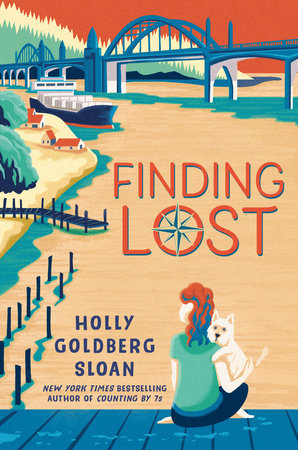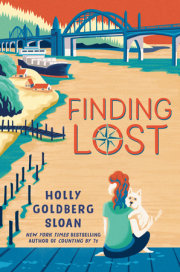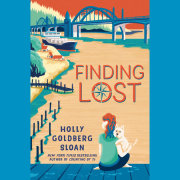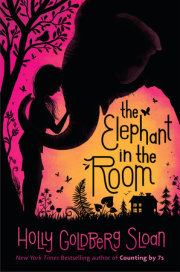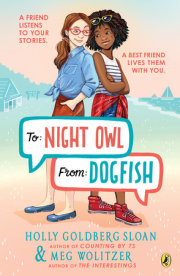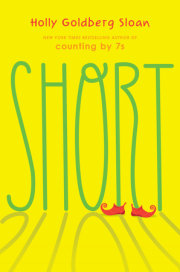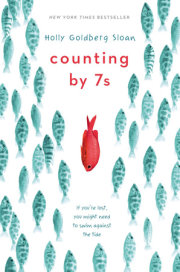1.
It’s always windy here.
I live on the Oregon coast in a one-hundred-year-old wooden building that was supposed to store fishing stuff. At some point, a bathroom was put in. Then later what my mom calls “the worst kitchen in the world” was added. Mom says when she closes her eyes, she smells all the years of salty, slimy fishing nets. I don’t want to break it to her, but you can smell the past in here with your eyes open too.
What we call the boathouse, even if it never held a boat, sits high up the bank five hundred yards from where the Siuslaw River hits the Pacific Ocean. But when we look out the front window, we don’t see water. Our view is of the Big House, which is the fancy place that the McKern family owns. This is their second home and they visit only a few times a year. In August, they always show up for ten days. That’s when Oregon weather can fool a person. It’s warm, but never hot. The rain and cold air go on a short summer vacation and the fog that normally pushes down on my town disappears. People drive up from California and some of them make a big mistake and buy property here. It’s called “buyer’s remorse” when you realize you messed up like that.
Remorse is one of the words people don’t really say very much.
Re means “again” in Latin. And
morse comes from the Latin “to bite.” So,
remorse means to bite again, which could be the pain from something you’d like to change.
I bet the McKerns have remorse, only I’m just guessing.
Mom says we should be grateful that there are people who make popular video games in California and get fooled into thinking a big house on the Oregon coast in the small town of Florence is something they want to own, because it means that we can live at their place.
The McKerns call Mom their property manager. She doesn’t get a salary, but we don’t have to pay rent or any of the utility bills, and when things here break, we can use their credit card to fix them. That’s good because there’s a lot falling apart. One whole category of problems are the doors. The knobs, which are made of old purple glass, look great but they’re always coming off. Besides that, you can only open the oven door partway because it hits the wall. And the refrigerator door is hinged in the wrong direction, so you need to squeeze into the corner to get something out. Also, the roof leaks, which is why we keep buckets on the kitchen counter. I’m used to the sound of the drips. Mom says the slope is wrong and there isn’t good drainage. She must be right, because last April they took off the old roof and started over. But it didn’t fix the problem.
If you have bad drainage, you will always have bad drainage.
We’re supposed to be keeping an eye on the property. I do that by staring through the cloudy front window and wondering why we can’t go into the Big House to watch something on one of the large TVs, or play a game of pool in what’s called the “rec room.” But only Mom is allowed inside. She has a routine where she walks around and checks the windows and doors. Once a day she flushes the toilets. She always turns on a few lights. She picks different ones each day to let people know things aren’t just on timers. Every week she runs the water for two straight minutes in the four showers and the two bathtubs.
Plumbing, I guess like most things, doesn’t do so great left alone.
The McKerns have internet, which we share, only it can be spotty for us in the boathouse. I think we should ask about getting a signal booster, but Mom says we’ve got a good thing going and not to complain. If I want to watch a show on Mom’s computer without a lot of stopping and starting, I go sit on the Big House back deck, which looks out onto the water. It doesn’t matter what time of year, I always wear my heavy coat and a knit hat and I bring a blanket. But even if it’s raining (which it is most days), the overhang of the roof keeps me dry.
It’s loud under the alcove. The wind comes across the sand dunes on the other side of the water and blows hard. It’s like a whistle. And there’s also the roaring sound of the river and the crashing of the ocean waves. The noise of rain hitting the deck of the Big House blends into the drops pinging on the Siuslaw. A drizzle on water can be louder than heavy rainfall, which doesn’t seem right but has something to do with bubbles that break on the river’s surface from the smaller drops. I’m not any kind of scientist, but I pay attention to things.
We didn’t always live here.
Two years and four months ago we were renting a house on Buckskin Bob Road, which sounds like a joke but was the name of my old street. It was in Dunes City, just south of Florence. We were only two blocks from Siltcoos Lake. Our house was light yellow with blue trim, and our roof didn’t leak. The rental had three bedrooms and there was a fenced-in backyard, which was to keep out the deer. There was old wall-to-wall carpeting that felt soft on my bare feet. We had a washer and dryer in the garage and an island in the kitchen. Mom says she never thought a kitchen island was important until we didn’t have one.
Two years and four and a half months ago my little brother, Geno, and I also had a dad. But on April 4, very early in the morning, there was The Accident, which is what we call what happened. If Dad hadn’t been on his boat in the dark pulling up crab pots, he wouldn’t have hit the sand bar, which cracked the hull of the boat, and the sneaker wave wouldn’t have knocked him into the freezing water.
And everything in the world would be different.
My dad was a commercial crab fisherman, which is why his hands had a lot of calluses. He grew up in this part of Oregon and he was carrying on his family’s tradition, even though his parents had moved away. Dad’s mother and father got divorced when he was little and his mom moved to Alaska after he finished high school. He was an only child. Pop-Pop, my grandfather, turned the crabbing business over to Dad once he thought he was ready. After that, Pop-Pop got rid of his stuff, gave Dad his truck, and rode off on a motorcycle that had a lot of chrome. I was little and didn’t understand. I guess I still don’t. I remember Pop-Pop, but I guess what I’m remembering are pictures I’ve seen, not the real person. Mom wasn’t able to find Pop-Pop to tell him about The Accident. Sometimes I think that’s better because for Pop-Pop, Dad is still alive (even though I wonder how close they really were—it’s not like he’s been checking in on any of us).
Mom didn’t grow up here. Her family is from Coos Bay, which is also on the coast but an hour’s drive south. They weren’t water people. They worked driving logging trucks. But none of them are in Coos Bay anymore. One of Mom’s brothers, Caleb, moved up to Spokane, Washington, and Uncle Mike and his wife split up and he lives in Texas now. After her brothers left, Mom’s parents bought a used RV and they started traveling around, mostly in Arizona. Mom says that when you get older you can only take so much sadness and you don’t think your heart will hold out if you hear any more bad news. I don’t know if that’s what happened, but they didn’t come back after The Accident. They told Mom to move us to Arizona. Grandma Carol said they weren’t going to spend another minute being “rainy-day people.” It’s too bad because my little brother and I could use a grandma and grandpa or some aunts, uncles, and cousins.
After The Accident we put Dad’s ashes in the Siuslaw River under the bridge. Geno thinks this means most of him settled down into the sandy bottom, but I watched the gray powder float away on top of the water. I think it washed straight out into the ocean, because he would have wanted that.
My father used to say I was a Daughter of the Sea. He meant it in a good way because he loved the ocean and he was hoping he’d passed that feeling down to me.
Only I don’t love the sea.
I used to be okay with it, but since The Accident I’m afraid of the waves.
My little brother, Geno, likes to throw sticks into the river and watch them get swept away. I wonder if he’s thinking about Dad, but I never ask. Geno is more than four years younger than me and he doesn’t have red hair like I do. Or gray eyes. When someone is talking about him, they usually say “Geno is the sweetest boy.” I would find this super annoying, except it’s true. He is sweet and I guess either you’re born that way or you’re not. Geno’s real name is Genesis, which is a brand of car and an old rock band and a famous religious writing. It’s also a healthcare system, a chain of gyms, and a company that makes loudspeakers.
We call him Geno because it’s less confusing, but we’re not Italian.
I’m lucky that my name doesn’t have that kind of history.
I’ve never heard of anyone with the name Cordy, so I have to repeat it a bunch of times when I first meet someone. My actual name is Cordelia, but no one on the planet has ever called me that. I like my name, even though every now and then someone calls me Corky.
That is
not okay.
I wish there was the letter
z in my name. That letter is worth ten points in Scrabble. I always hope I get the
z tile when I play that game. If you have a
z in your name, it might mean you’re lucky.
Until The Accident, I never thought much about good luck or bad luck. Now it’s always on my mind. What happened to my dad was very, very, very bad luck.
I’m waiting for a run of very, very, very
good luck.
I try to force myself to believe that could happen.
We’ve been on a roll of bad luck for a while now.
Before The Accident, Mom had been taking classes at Lane Community College. She’d been studying to be a nurse. Once we lost Dad, we stayed too long at the yellow rental house and she had to quit school. There wasn’t a savings account, and we didn’t have life insurance. That was bad planning. I don’t remember ever hearing about savings or insurance until it seemed like that’s all anyone who came over to sit with Mom on the tan couch wanted to talk about.
Then we got a break because Fern Robateau needed a knee replacement and Mom was hired to do her job as a waitress at Curly’s Seafood. The people there liked Mom so much that even when Fern could bend her knee again, they kept Mom on staff. A lot of people want to work at Curly’s because it’s known for serving the best food for miles. It’s just under the Siuslaw River Bridge right on the water in what’s known as Florence’s Old Town. The restaurant is famous for clam chowder, which isn’t my favorite because I don’t like thick soup. It’s like eating gravy. And also, it can be gritty. That’s from the sand in the clams, not an ingredient in the recipe. Mom says people love it, only I wonder if they just pretend to.
Once something is accepted as being special, it’s hard to convince people they might be wrong.
Mom says the secret ingredient in the recipe is whipping cream, but not to tell. That’s why it’s thick, but also sugary. At Curly’s, the cooks put that in the Tenderloin Steak Diane too. But hardly anybody orders meat there.
Florence, Oregon, has a lot of retired people and tourists just passing through. When I ask why, Mom says that the logging business went away and the fishing isn’t what it used to be. Plus, people don’t like small towns very much anymore. She gets a look on her face and I know she’s talking about herself. Since The Accident, she’s been planning on finding a way out of here. This place is nearly all Geno and I have ever known, so it doesn’t feel very good to hear that she’s got an escape plan. But Mom is happier right now because we’re heading into summer. That means there will be a line to eat at Curly’s and she can make three times as much money as she does in the winter. She’s all about her bank account. She’s saving so we can “make a life change.”
Just thinking about that gives me a stomachache.
Mom had just started working at Curly’s when her friend Taffy came in and told her that a family from California had bought the fancy property on Shoreline Drive right where the river meets the ocean, and they were looking for someone to live in their boathouse and take care of things. Taffy told the people she would send Casey Jenkins right over and that Casey would be a perfect fit.
Taffy is good at persuading people. She does phone sales.
When I first heard about all this, I imagined we’d be moving into a place with fancy models of boats, like the kind Stuart Little sailed in Central Park. The boathouse would be fixed up with pretty furniture and amazing views, and all that open river water would feel so close you’d believe you could reach out and touch it. But at the same time, you’d be far enough away to feel safe from the ocean’s waves.
I got that wrong.
I’m guessing when the McKerns heard someone named Casey Jenkins was interested in living for free in their boathouse and looking after things, they imagined Casey Jenkins would be a strong guy who drove a pickup truck filled with power tools and he’d love to fix stuff.
They got that wrong.
Instead, they got us.
2.
I go to Siuslaw Middle School.
It’s part of the Siuslaw School District in the coastal town of Florence, Oregon: Population 9,577. The Siuslaw were one of the tribes of the indigenous Siletz people who were the first to settle this area. All the schools here have a Viking as their mascot.
There were no Vikings in the state of Oregon.
But “cultural contradictions are part of life.”
I didn’t come up with that. Dad did when I asked him about the Viking thing. One of the most famous Vikings was named Ivar the Boneless. He was a choice in last year’s “Famous People to Learn About” project. After I heard the name, I wasn’t interested in researching the guy. I was hoping for Jane Addams, who was a “Pioneer for Social Change” and won the Nobel Peace Prize. But Riley Moshofsky was given Jane Addams. She was happy because her great-grandma was named Jane. I got Albert Einstein. I didn’t pick him; he was assigned to me. I think I did a good job of telling the class about one of the most influential scientists to ever live. The quote from Mr. Einstein that I like the best is: “I have no special talent. I am only passionately curious.”
I’m not sure I’m passionately curious, but I do have a lot of questions about things.
My best friend is named Button Hennigan. The name on her birth certificate is Madison Hennigan, but when she was just a baby, her dad said she was “cute as a button.” And the name stuck. No one looks at a button now and thinks it’s “cute,” but that word in the olden days used to mean “smart.” And being able to close something with a button was considered clever. At least that’s what I read. Somewhere along the line,
cute changed to mean “pretty” or “sweet.” Button is always worried someone will shorten her name, which happened when a boy named Carl Eddy liked her. Luckily, he moved away after third grade. Button has been a big help since The Accident. She understands when I’m feeling empty or sad inside. There are a lot of days when it’s like I’m carrying an invisible backpack filled with sand.
There is only one problem with having Button as a best friend and that’s the fact that she’s in a swim club. Almost every weekend she goes somewhere with her team. She does the crawl and the backstroke. Button has two things that make her a faster swimmer than other kids her age: her long arms and big feet. She wears size ten shoes and says she would be mad about having what she calls clown feet, only she thinks it’s the secret to her swimming success.
Button wants to one day go to the Olympics. I bet she makes it. I tell her all the time that it’s in her future. Before Button started swimming every day, we’d always do something after school, but now I go home by myself. I’m okay with that. I use that time to think about Dad.
Mom says we will always be recovering from The Accident because there’s no getting over what we lost.
It’s a two-mile walk from school to the boathouse. Sometimes I head over to the elementary school, which is right next to the middle school. Geno waits for me out front by the flagpole. But most days he wants to go home with his friend Jose, and I walk back to the boathouse alone.
Today Geno has one of his playdates with Jose, so he isn’t with me. I head up to Thirty-fifth Street and make a left when I hear a bunch of squeaks behind me and realize I’m being followed. I turn to see a little dog on the sidewalk. He isn’t too close, and at first, I think he’s gotten out of a yard. I keep walking, but by the time I make it to Shoreline Drive, the little dog is still trailing me. I stop and shout really loud, “Go home!”
My voice comes out angry even though I’m not mad, I’m just trying to make a strong point.
I watch the dog’s small ears, which are perfect triangles, go flat against his head. He looks scared. I feel bad for yelling at him, but Shoreline is a busy street and I don’t want to be responsible if he runs out in front of a car.
I look more closely and I can see the dog is really thin. I wonder when he last ate something. Then I remember I have half of my peanut butter sandwich left over from lunch. I pinch off a piece, crouch down low, and hold out the bread. The little dog runs right up and lunges at the food. He’s frantic so he must be really hungry. I look into his eyes and I see sadness, which I know about.
I ask him, “Are you lost?”
Obviously, he doesn’t answer.
But he does make a small squeak.
The little dog is soaking wet. He doesn’t have a collar and his legs and belly are really dirty. His fur is matted, like he’s been lying down in the mud for a long time. He isn’t a puppy. He has gray hairs around his eyes and all over his muzzle. I squat lower and feed him the rest of the sandwich, piece by piece. When he’s done, he eats the two carrot sticks I have in the bottom of my lunch sack. It seems like they’re hard for him to chew, but he still gobbles them up. That’s how hungry he is.
After he’s done eating, he leans against my leg and his head rests on my left knee. Through my jeans I can feel him trembling. That does it. I pick up the little dog and carry him under my arm like a football. He keeps lifting his head to stare at me; his black eyes look so grateful. He has a wet nose and bad breath, but I still think he’s perfect.
Copyright © 2025 by Holly Goldberg Sloan. All rights reserved. No part of this excerpt may be reproduced or reprinted without permission in writing from the publisher.

